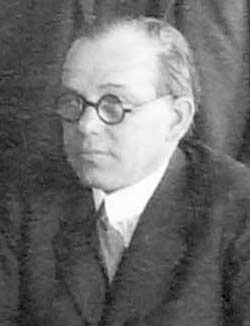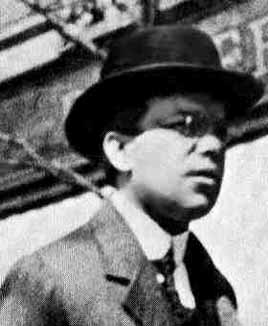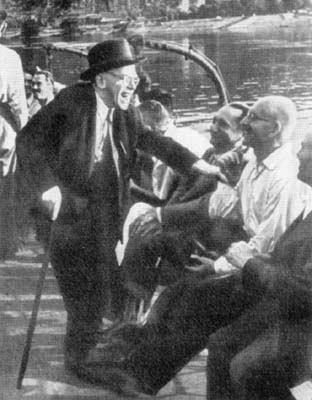<Back to Index>
- Mathematician Lipót Fejér, 1880
- Composer Alban Maria Johannes Berg, 1885
- Prime Minister of the Cape Colony Leander Starr Jameson, 1853
PAGE SPONSOR



Lipót Fejér (or Leopold Fejér) (February 9, 1880, Pécs – October 15, 1959, Budapest) was a Hungarian mathematician.
Fejér was born Leopold Weiss, and changed to the Hungarian name Fejér around 1900.
Fejér studied mathematics and physics in Budapest and Berlin, where he was taught by Hermann Schwarz. From 1902 to 1905 Fejér taught at the University of Pázmány Péter and from 1905 until 1911 he taught at Kolozsvár in Hungary (now Cluj-Napoca in Romania). In 1911 Fejér was appointed to the chair of mathematics at the University of Budapest and he held that post until his death. He was elected corresponding member (1908), member (1930) of the Hungarian Academy of Sciences.
During his period in the chair at Budapest Fejér led a highly successful Hungarian school of analysis. He was the thesis advisor of mathematicians such as John von Neumann, Paul Erdős, George Pólya and Pál Turán.
Lipót Fejér is buried in Kerepesi Cemetery in Budapest.
Fejér's research concentrated on harmonic analysis and, in particular, Fourier series.
Fejér collaborated to produce important papers, one with Carathéodory on entire functions in 1907 and another major work with Frigyes Riesz in 1922 on conformal mappings (specifically, a short proof of the Riemann mapping theorem).
Pólya writes the following about Fejér, telling us much about his personality: He
had artistic tastes. He deeply loved music and was a good pianist. He
liked a well-turned phrase. 'As to earning a living', he said, 'a
professor's salary is a necessary, but not sufficient, condition.' Once
he was very angry with a colleague who happened to be a topologist, and explaining the case at length he wound up by declaring '... and what he is saying is a topological mapping of the truth'. In the same article Pólya writes about Fejér's style of mathematics: Fejér
talked about a paper he was about to write up. 'When I write a paper,'
he said, 'I have to rederive for myself the rules of differentiation
and sometimes even the commutative law of multiplication.' These words
stuck in my memory and years later I came to think that they expressed
an essential aspect of Fejér's mathematical talent; his love for
the intuitively clear detail.
He
had a quick eye for foibles and miseries; in seemingly dull situations
he noticed points that were unexpectedly funny or unexpectedly
pathetic. He carefully cultivated his talent of raconteur; when he
told, with his characteristic gestures, of the little shortcomings of a
certain great mathematician, he was irresistible. The hours spent in
continental coffee houses with Fejér discussing mathematics and
telling stories are a cherished recollection for many of us.
Fejér presented his mathematical remarks with the same verve as
his stories, and this may have helped him in winning the lasting
interest of so many younger men in his problems.
It was not given to him to solve
very difficult problems or to build vast conceptual structures. Yet he
could perceive the significance, the beauty, and the promise of a
rather concrete not too large problem, foresee the possibility of a
solution and work at it with intensity. And, when he had found the
solution, he kept on working at it with loving care, till each detail
became fully transparent.
It is due to such care spent on the
elaboration of the solution that Fejér's papers are very clearly
written, and easy to read and most of his proofs appear very clear and
simple. Yet only the very naive may think that it is easy to write a
paper that is easy to read, or that it is a simple thing to point out a
significant problem that is capable of a simple solution.